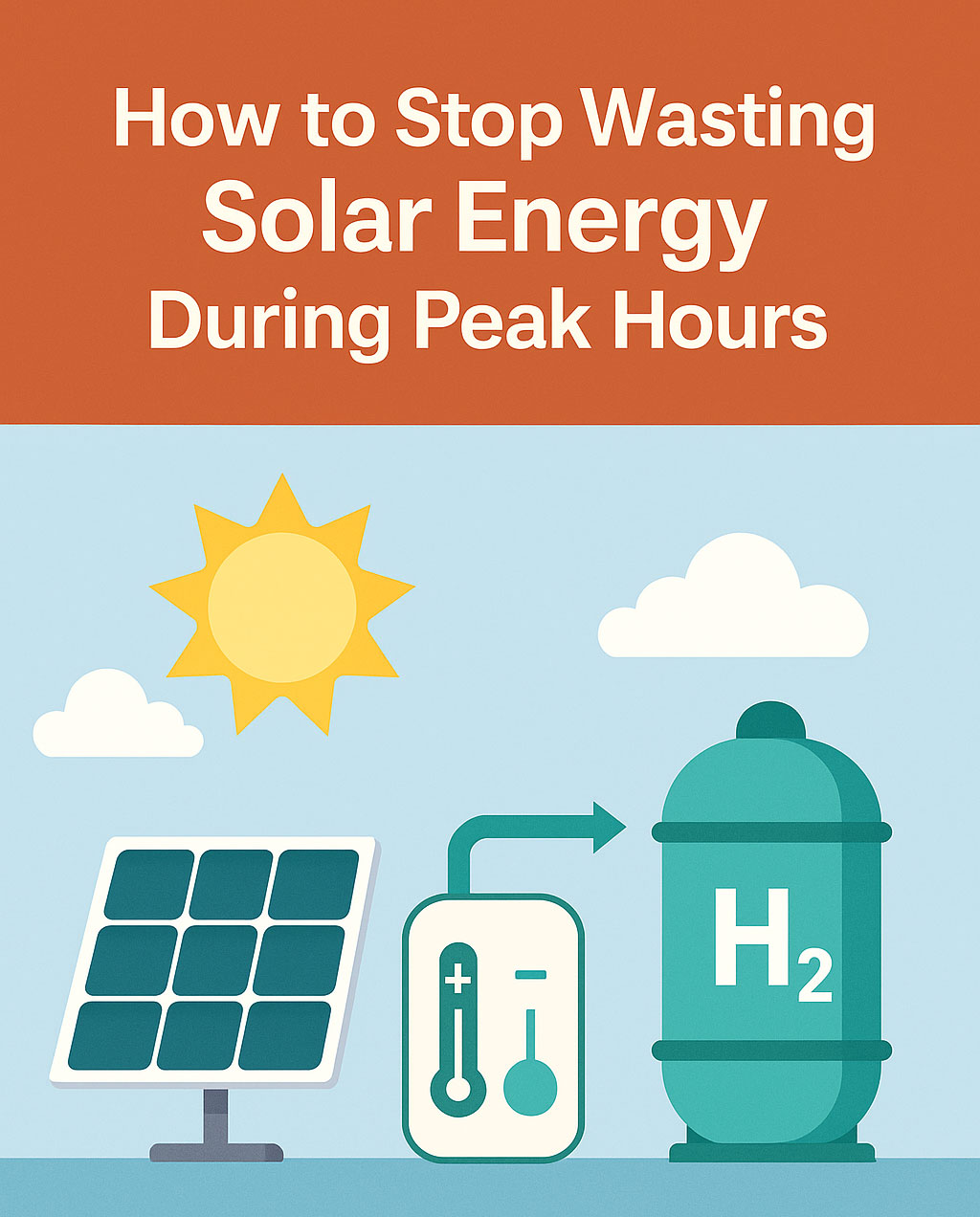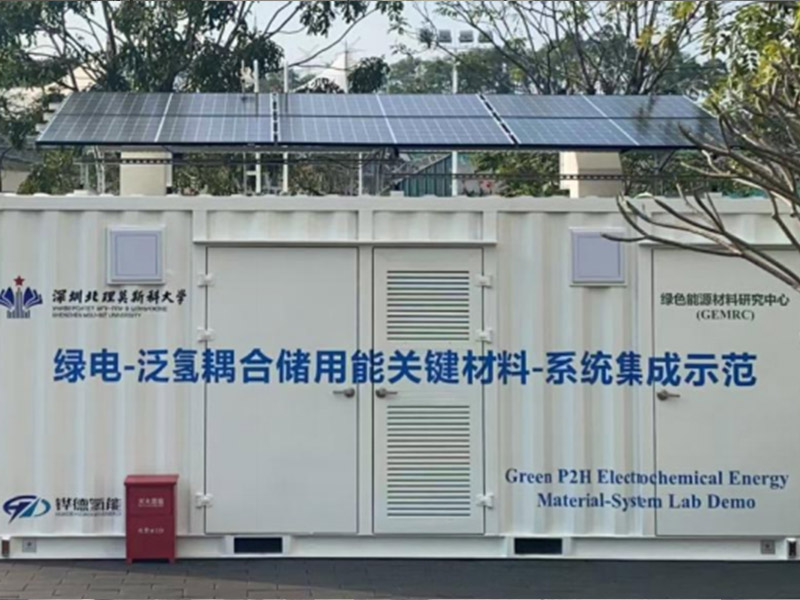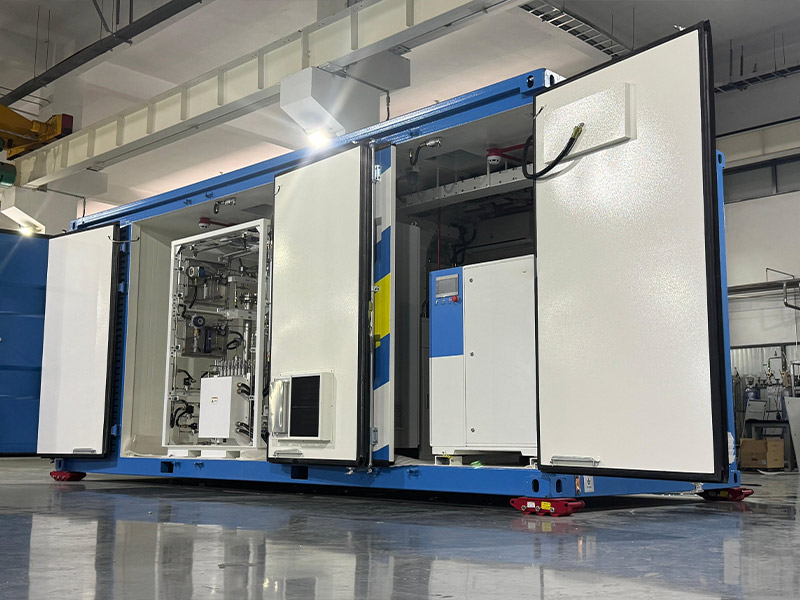Solar power is a game changer in the clean energy revolution. But even the sunniest day can’t guarantee perfect energy efficiency — especially during peak hours when your solar panels are producing more electricity than you can use or store. So, what happens to the excess energy? In many cases, it’s wasted.
However, there’s a smart and sustainable solution: solar-powered hydrogen production. By converting surplus solar energy into hydrogen, you can store clean energy long-term and use it anytime — day or night. Let’s dive into how this works and how it can stop energy waste for good.

Keypoints
l Solar panels often produce excess energy during peak daylight hours that goes unused due to battery limitations and grid constraints.
l Hydrogen production via electrolysis converts wasted solar energy into storable fuel, enabling long-term energy storage for days or even months.
l Stored hydrogen can be used to generate electricity at night, heat homes, power vehicles, or provide backup during outages, ensuring 24/7 energy access.
l Unlike batteries, hydrogen systems scale easily and don’t degrade over time, offering a lifespan of 20+ years with minimal environmental impact.
l Solar-hydrogen systems are ideal for achieving energy independence, reducing reliance on the grid, and maximizing renewable energy utilization.
Solar panels are most productive when the sun is strongest, typically from late morning to early afternoon. However, household energy consumption usually peaks in the evening, creating a mismatch between supply and demand. Without efficient storage, the surplus energy generated during daylight hours can’t be used when it's needed most.
Problems with traditional solar energy storage:
l Battery capacity limits:
Conventional battery systems, such as lithium-ion storage, have limitations in terms of cost, lifespan, and environmental impact. They may also struggle to store large quantities of energy for long durations, especially over cloudy weeks or during winter months.
l Grid feed-in limits: Not all systems can send excess energy back to the grid — and some utilities limit how much you can export.
l Loss of excess energy: Without efficient storage, surplus solar electricity may simply go unused.
This is where solar hydrogen becomes incredibly valuable. Instead of letting that excess power go to waste, use it to create hydrogen through a process called electrolysis. This means splitting water into hydrogen and oxygen using electricity.
By using excess electricity from solar panels to power an electrolyzer, homeowners can split water into hydrogen and oxygen. The hydrogen is then stored and later used in a fuel cell to generate electricity or heat. This method not only provides long-term energy storage but also significantly reduces carbon emissions.
Scalable Storage: Unlike batteries, hydrogen energy storage allows for large-volume, long-duration energy retention, making it ideal for full-home energy backup.
Clean and Sustainable: Solar hydrogen is produced using renewable power, creating a zero-emission energy loop.
Versatile Usage: Stored hydrogen can power appliances, heating systems, and even electric vehicles.
A home solar hydrogen system combines rooftop solar panels, an electrolyzer, and a hydrogen storage tank. These systems are increasingly accessible for residential use, helping homeowners create a mini power plant right at home.
l Independence from the Grid: These systems allow users to store their own solar energy and use it when needed, reducing reliance on utility companies.
l Energy Security: With power outages on the rise, having an independent storage solution provides peace of mind.
l Smart Investment: Though initial setup costs exist, the long-term savings and energy autonomy often outweigh them.
Hydrogen doesn’t just store energy — it expands your solar system’s capability, helping you move toward full energy self-sufficiency.
Here’s what a typical setup might include:
1. Solar panels collect sunlight and produce electricity.
2. An electrolyzer uses this electricity to split water into hydrogen and oxygen.
3. Hydrogen storage tanks safely store the hydrogen gas.
4. Fuel cells or hydrogen appliances convert stored hydrogen back into electricity or heat when needed.
This system can dramatically reduce energy waste and reliance on the grid.
The hydrogen generated from solar surplus can power many applications:
l Nighttime electricity through hydrogen fuel cells
l Home heating using hydrogen boilers or heaters
l Backup power during outages
l Electric vehicles if converted to hydrogen fuel
This approach turns daytime excess into all-day energy security.
While batteries like lithium-ion are popular for solar storage, they have limitations — especially when it comes to scalability and long-term storage.
|
Feature |
Batteries |
Solar-to-Hydrogen |
|
Short-term storage |
√ |
√ |
|
Long-term seasonal storage |
❌ |
√ |
|
Scalability |
Limited |
High |
|
Environmental impact |
Some waste |
Very low |
|
Lifespan |
~10 years |
~20 years or more |
Hydrogen offers a sustainable solution that grows with your energy needs.
If you’re a homeowner or business owner with solar panels and want to stop wasting energy, here are your next steps:
l Evaluate your solar system’s peak output and how much energy is going unused.
l Consider installing a solar hydrogen system, or work with companies that specialize in hydrogen integration.
l Monitor your energy consumption and storage to ensure efficient use throughout the day.
This investment can lead to long-term savings, lower carbon emissions, and total energy control.
Wasting solar energy during peak hours is no longer necessary. With the rise of solar hydrogen technology and efficient hydrogen energy storage, homeowners can harness and store every drop of sunshine. Investing in a home solar hydrogen generator not only ensures round-the-clock energy availability but also paves the way toward true energy independence and sustainability. It’s not just a smart move—it’s the future of green living.
1. Why is solar energy wasted during peak hours?
Solar panels often generate more electricity than homes/businesses can use or batteries can store, especially midday when demand is low.
2. How does hydrogen storage solve this problem?
Excess solar power splits water into hydrogen via electrolysis, storing energy indefinitely for later use in fuel cells or appliances.
3. Is hydrogen storage better than batteries?
For long-term (seasonal) storage, yes—hydrogen lasts decades without degradation, while batteries are limited to short-term use and degrade over time.
4. What can stored hydrogen power?
Homes (electricity/heat), vehicles, or industrial equipment, providing clean energy even when the sun isn’t shining.
5. How much energy can hydrogen store compared to batteries?
Hydrogen offers higher energy density and is more suitable for long-term, large-scale storage compared to traditional batteries.
6. Is hydrogen safe to store at home?
Yes, modern systems are designed with advanced safety features like pressure regulation, leak detection, and automatic shutoff.
7. How much does a solar-hydrogen system cost?
Higher upfront costs than batteries, but long-term savings and scalability make it cost-effective for energy independence.
8. Can I retrofit my existing solar panels for hydrogen storage?
Yes! Electrolyzers can integrate with most solar systems, though you may need to expand your solar array to offset energy losses during conversion.
9. Where is solar hydrogen storage being used today?
Off-grid homes, microgrids, and industries in regions like Europe and Australia, with growing adoption in residential markets.
10. Can solar hydrogen systems work in cloudy climates?
Yes. While solar input may be lower, hydrogen systems store excess energy from sunnier days to be used later, ensuring a stable supply.
Hydrogen can be stored indefinitely without losing energy, unlike batteries which degrade over time.
12. Is a home solar hydrogen generator expensive?
Prices are gradually decreasing. Though the initial investment is higher than solar-only systems, the long-term savings and independence make it a smart choice.


